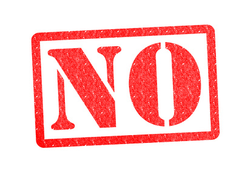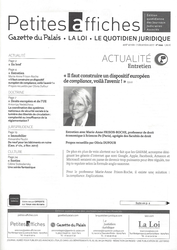Feb. 15, 2024
Thesaurus : Doctrine

► Full Reference: J. Heymann, "The Legal Nature of the Facebook “Supreme Court”", in M.-A. Frison-Roche (ed.), Compliance Jurisdictionalisation, Journal of Regulation & Compliance (JoRC) and Bruylant, "Compliance & Regulation" Serie, 2024, pp. 167-182
____
📘read a general presentation of the book, Compliance Jurisdictionalisation, in which this article is published
____
► Summary of the article (done par the Author): Taking place in the general theme aiming at making “words and things coincide”, the article offers some thoughts on the “conditions of the discourse” – in the sense in which Foucault understood it in his Archéologie des sciences humaines – relating to the phenomenon of “jurisdictionalization” of Compliance.
The thoughts are more specifically focusing on the nature of the so-called “Supreme Court” that Facebook instituted to hear appeals of decisions relating to content on the digital social networks that are Facebook and Instagram. Is this really a “Supreme Court”, designed in order to “judge” the Facebook Group?
A careful examination of the Oversight Board – i.e. the so-called “Supreme Court” created by Facebook – reveals that the latter, in addition to its advisory mission (which consists of issuing policy advisory opinions on Facebook’s content policies), exercises some form of adjudicative function. This is essentially conceived in terms of compliance assessment, of the content published on the social networks Facebook or Instagram with the standards issued by these corporations on the one hand, of content enforcement decisions taken by Facebook with the Law on the other hand. The legal framework of reference is yet rather vague, although its substantial content seems to be per se evolutive, based on the geographical realm where the case to be reviewed is located. An adjudicative function can therefore be characterized, even if the Oversight Board can only claim for a limited one.
The author can ultimately identify the Oversight Board as a preventive dispute settlement body, in the sense that it seems to aim at avoiding any referral to state courts and ruling before any court’s judgement can be delivered. Some questions are thus to be raised, relating with both legitimacy and authority of such a Board. But whatever the answers will be, the fact remains that the creation of the Oversight Board by a private law company already reveals all the liveliness of contemporary legal pluralism.
____
🦉This article is available in full text to those registered for Professor Marie-Anne Frison-Roche's courses
_________
Updated: Feb. 2, 2023 (Initial publication: June 23, 2021)
Thesaurus : Doctrine

► Full Reference: J. Heymann, "La nature juridique de la "Cour suprême" de Facebook" ("The legal nature of Facebook's "Supreme court""), in M.-A. Frison-Roche (ed.), La juridictionnalisation de la Compliance, coll. "Régulations & Compliance", Journal of Regulation & Compliance (JoRC) and Dalloz, 2023, p. 151-167.
____
📕read a general presentation of the book, La juridictionnalisation de la Compliance, in which this article is published
____
► The summary below describes an article following the colloquium L'entreprise instituée Juge et Procureur d'elle-même par le Droit de la Compliance , co-organized by the Journal of Regulation & Compliance (JoRC) and the Faculté de Droit Lyon 3. This manifestation was designed under the scientific direction of Marie-Anne Frison-Roche and Jean-Christophe Roda and took place in Lyon on June 23, 2021.
In the book, the article will be published in Title I, devoted to: The Entreprise instituted Judge and Prosecutor of itself by Compliance Law.
____
► Summary of the article (done by the author): Taking place in the general theme aiming at making “words and things coincide”, the article offers some thoughts on the “conditions of the discourse” – in the sense in which Foucault understood it in his Archéologie des sciences humaines – relating to the phenomenon of “jurisdictionalization” of Compliance.
The thoughts are more specifically focusing on the nature of the so-called “Supreme Court” that Facebook instituted to hear appeals of decisions relating to content on the digital social networks that are Facebook and Instagram. Is this really a “Supreme Court”, designed in order to “judge” the Facebook Group?
A careful examination of the Oversight Board – i.e. the so-called “Supreme Court” created by Facebook – reveals that the latter, in addition to its advisory mission (which consists of issuing policy advisory opinions on Facebook’s content policies), exercises some form of adjudicative function. This is essentially conceived in terms of compliance assessment, of the content published on the social networks Facebook or Instagram with the standards issued by these corporations on the one hand, of content enforcement decisions taken by Facebook with the Law on the other hand. The legal framework of reference is yet rather vague, although its substantial content seems to be per se evolutive, based on the geographical realm where the case to be reviewed is located. An adjudicative function can therefore be characterized, even if the Oversight Board can only claim for a limited one.
The author can ultimately identify the Oversight Board as a preventive dispute settlement body, in the sense that it seems to aim at avoiding any referral to state courts and ruling before any court’s judgement can be delivered. Some questions are thus to be raised, relating with both legitimacy and authority of such a Board. But whatever the answers will be, the fact remains that the creation of the Oversight Board by a private law company already reveals all the liveliness of contemporary legal pluralism.
________
Oct. 5, 2021
Compliance: at the moment

June 18, 2021
Compliance: at the moment

► Law is slow, but firm. By its judgment of June 15, 2021, Facebook , the European Union Court of Justice widely interprets the powers of National Authorities, since they serve the people protection in the digital space (➡️📝(CJEU, June 15, 2021, Facebook).
Law is slow. The reproach is so often made. But the bottom line is that, in the noise of changing regulations, it establishes clear and firm principles, letting everyone know what to stand for. The more the world is changing, the more Law is required.
When Law degenerates into regulations, then it is up to the Judge to make Law. "Supreme Courts" appear, de jure as in the United States, de facto as in the European Union by the Court of Justice of the European Union which lays down the principles, before everyone else, as it did for the "right to be forgotten" in 2014 (➡️📝CJEU, Google Spain, May 13, 2014), and then with the impossibility of transferring data to third countries without the consent of the people concerned (➡️📝CJEU, Schrems, October 6, 2015).
Facebook litigation is kind of a novel. The company knows that it is above all to the Courts that it speaks. In Europe, it is doing it behind the walls of the Irish legal space, from which it would like to be able not to leave before better dominating the global digital space, while national regulatory authorities want to take it to protect citizens.
There is therefore a technical question of "jurisdictional competence". The texts have provided for this, but Law is clumsy because it was designed for a world still anchored in the ground: the GDPR of 2016 therefore organizes cooperation between national regulatory authorities through a "one-stop-shop", forcing the authorities to relinquish jurisdiction so that the case is only handled by the "lead" National Authority. This avoids splintering and contradiction. But before the adoption of the GDPR, the Belgian data protection regulator had opened a procedure against Facebook concerning cookies. The "one-stop-shop" mechanism, introduced in 2016, is therefore only mentioned before the Brussels Court of Appeal, which is asked to relinquish jurisdiction in favor of the Irish Regulatory Authority, since the company has in Europe its head office in this country. The Court of Appeal referred to the CJEU for a preliminary ruling.
By its judgment of June 15, 2021 (➡️📝CJUE, Facebook, June 15, 2021), it follows the conclusions of its Advocate General and maintains the jurisdiction of the Belgian National Regulator because, even after the GDPR, the case still undergoes national treatment. In this decision, the most important is its reasoning and the principle adopted. The Court notes that the "one-stop-shop" rule is not absolute and that the national regulatory authority has the power to maintain its jurisdiction, in particular if cooperation between national authorities is difficult.
Even more, will it not one day have to adjust Law more radically? We need to consider the fact that the digital space is not bound by borders and that the ambition of "cross-border cooperation" is ill-suited. It is of course on this observation of inefficiency, consubstantial with the digital space, that the European Public Prosecutor's Office (EPPO) was designed and set up, which is not a cooperation, nor a "one-stop shop", but a body of the Union, acting locally for the Union, directly linked to Compliance concerns (➡️📝Frison-Roche, M.-A. "The European Public Prosecutor's Office is a considerable contribution to Compliance Law", 2021 and ., European Public Prosecutor's Office comes on stage: the company having itself become a private prosecutor, are we going towards an alliance of all prosecutors ?, 2021).
So that's what we should be inspired by.
June 17, 2021
Compliance: at the moment

► Compliance Law and Competition: for building, is it necessary to legislate ? Example of quasi-public interest judicial agreement: the French Competition Authority's Statement of June 3, 2021 on Facebook
The French law so-called "Sapin 2" of 2016, organized the "convention judiciaire d’intérêt public - CJIP" (Public Interest Judicial Agreement) which allows the prosecutor to undertake not to prosecute a company in returns for this company's commitments for the future. Is this mechanism reserved for this law, which only concerns corruption and bribery? The answer is often positive.
Is it so obvious?
Since the entity having the power to prosecute therefore always has the power not to prosecute. As the company always has the freedom to make commitments for the future. And everything stops.
News in Competition Law illustrate this. On June 9, 2021, as part of a transaction, the Autorité de la concurrence (French Competition Authority) sanctions Google (➡️📝 Communiqué of the Autorité de la Concurrence , translated in English by the French Competition Authority) , which has not contested the facts, for abuse of dominant position for having privileged its services in the online advertising services. Similar facts were alleged against Facebook. But on June 3, 2021, the Autorité de la concurrence (French Competition Authority) published a "communiqué de presse" (➡️📝statement translated in English by the French Competition Authority) saying that Facebook has, during the investigation, proposed commitments regarding its future behavior. It is remarkable that this statement on Facebook is published as an “acte de régulation” (regulatory act).
Yes, it is indeed an regulatory act about the future and structuring the online advertising area, internalized in this company which engages itself in its future behavior. With its statement, the Competition Authority invites the “acteurs du secteur” (actors of this sector) to make observations, for the development of what will be a sort of compliance program.
In these negotiations which are akin to a game table, where everyone calculates without knowing if they enter into a negotiation or a confrontation, the first game assuming that one shows more cards than in the second, it is indeed towards a kind of Public Interest Judicial Agreement that they are going with a Competition Authority which is both Judge and Prosecutor, concludes the agreement and, through a later decision, gives it force. Under the various legal qualifications, it is indeed the same general mechanism of Compliance Law, well beyond the specific French law known as Sapin 2.
Managed in this way, Compliance Law being an Ex Ante corpus, transforms the Competition Authority, an Ex Post Authority, into an Ex Ante Authority, openly taking "acte de régulation" (Regulatory Act), and allows it to rely on the power of companies, thus “committed”, to structure markets, which are however not regulated. Like advertising or retailing areas (➡️📝see Frison-Roche, M.-A., From Competition Law to Compliance Law: Example of French Competition Authority's decision on central purchasing body in mass distribution, 2020).
Thus Compliance Law has achieved the autonomy of Regulatory Law with regards to the notion, which nevertheless seemed intimate to it, of "sector".
June 15, 2021
Thesaurus : 05. CJCE - CJUE
Full reference: CJEU, Grand chamber, Judgment Facebook Ireland e.a. v. Gegevensbeschermingsautoriteit, C-645-19, June 15, 2021
Read the abstract of the judgment done by the Court
Nov. 23, 2020
Interviews

Full reference: Frison-Roche, M.-A., Facebook: Quand le Droit de la Compliance démontre sa capacité à protéger les personnes (Facebook: When Compliance Law proves its ability to protect people), interview with Olivia Dufour, Actu-juridiques Lextenso, 23rd of November 2020
Read the interview (in French)
Read the news of the Newsletter MAFR - Law, Compliance, Regulation about this question
Nov. 1, 2020
Newsletter MAFR - Law, Compliance, Regulation

Full reference: Frison-Roche, M.-A., Due process and Personal Data Compliance Law: same rules, one Goal (CJEU, Order, October 29, 2020, Facebook Ireland Ltd v/ E.C.), Newsletter MAFR - Law, Compliance, Regulation, 1st of November 2020
Read by freely subscribing other news of the Newsletter MAFR - Law, Compliance, Regulation
Read Marie-Anne Frison-Roche's interview in Actu-juridiques about this decision (in French)
Summary of the news:
As part of a procedure initiated for anti-competitive behaviors, the European Commission has three times requested, between the 13th of March and the 11th of November 2019, from Facebook the communication of information, reitarated in a decision in May 2020.
Facebook contests it alleging that the requested documents would contain sensitive personal information that a transmission to the Commission would make accessible to a too broad number of observers, while "the documents requested under the contested decision were identified on the basis of wideranging search terms, (...) there is strong likelihood that many of those documents will not be necessary for the purposes of the Commission’s investigation".
The contestation therefore evokes the violation of the principles of necessity and proportionality but also of due process because these probatory elements are collected without any protection and used afterwards. Moreover, Facebook invokes what would be the violation of a right to the respect of personal data of its employees whose the emails are transferred.
The court reminds that the office of the judge is here constraint by the condition of emergency to adopt a temporary measure, acceptable by the way only if there is an imminent and irreversible damage. It underlines that public authorities benefit of a presumption of legality when they act and can obtain and use personal data since this is necessary to their function of public interest. Many allegations of Facebook are rejected as being hypothetical.
But the Court analyzes the integrality of the evoked principles with regards with the very concrete case. But, crossing these principles and rights in question, the Court estimates that the European Commission did not respect the principle of necessity and proportionality concerning employees' very sensitive data, these demands broadening the circle of information without necessity and in a disproportionate way, since the information is very sensitive (like employees' health, political opinions of third parties, etc.).
It is therefore appropriate to distinguish among the mass of required documents, for which the same guarantee must be given in a technique of communication than in a technic of inspection, those which are transferable without additional precaution and those which must be subject to an "alternative procedure" because of their nature of very sensitive personal data.
This "alternative procedure" will take the shape of an examination of documents considered by Facebook as very sensitive and that it will communicate on a separate electronic support, by European Commission's agents, that we cannot a priori suspect to hijack law. This examination will take place in a "virtual data room" with Facebook's attorneys. In case of disagreement between Facebook and the investigators, the dispute could be solved by the director of information, communication and medias of the Directorate-General for Competition of the European Commission.
___
We can draw three lessons from this ordinance:
- This decision shows that Procedural Law and Compliance Law are not opposed. Some often say that Compliance guarantees the efficacy and that Procedure guarantees fundamental rights, the protection of the one must result in the diminution of the guarantee of the other. It is false. As this decision shows it, through the key notion of sensitive personal data protection (heart of Compliance Law) and the care for procedure (equivalence between communication and inspection procedures; contradictory organization of the examination of sensitive personal data), we see once again that two branches of Law express the same care, have the same objective: protecting people.
- The judge is able to immediately find an operational solution, proposing "an alternative procedure" axed around the principle of contradictory and conciliating Commision's and Facebook's interests has shown that it was able to bring alternative solutions to the one it suspends the execution, appropriate solution to the situation and which equilibrate the interest of both parties.
- The best Ex Ante is the one which anticipate the Ex Post by the pre-constitution of evidence. Thus the firm must be able to prove later the concern that it had for human rights, here of employees, to not being exposed to sanctioning pubic authorities. This Ex Ante probatory culture is required not only from firms but also from public authorities which also have to give justification of their action.
__________
Aug. 31, 2020
Newsletter MAFR - Law, Compliance, Regulation

Full reference: Frison-Roche, M.-A., Compliance by Design, a new weapon? Opinion of Facebook about Apple new technical dispositions on Personal Data protection, Newsletter MAFR - Law, Compliance, Regulation, 31st of August 2020
Read by freely subscribing other news of the Newsletter MAFR - Law, Compliance, Regulation
Summary of the news:
Personal Data, as they are information, are Compliance Tools. They represent a precious resource for firms which must implement a vigilance plan in order to prevent corruption, money laundering or terrorism financing, for examples. It is the reason why personal data are the angular stone of "Compliance by design" systems. However, the use of these data cannot clear the firm of its simultaneous obligation to protect these same personal data, that is also a "monumental goal" of Compliance Law.
In order to be able to exploit these data in an objective of Compliance and protecting them in the same time, the digital firm Apple adopted for example new dispositions in order to the exploitation of the Identifier For Advertisers (IDFA) integrated in the iPad and in the iPhone and broadly used by targeted advertising firms, is conditioned to the consumer's consent.
Facebook reacted to this new disposition explaining that such measures will restrict the access to data for advertisers who will suffer from that. Facebook suspects Apple to block the access to advertisers in order to develop its own advertising tool. Facebook guaranteed to advertisers who work with it that it will not take similar measures and that it will always favor consultation before decision making in order to concile sometimes divergent interests.
We can sleep and already make some remarks:
- GDPR imposing to companies that they guarantee a minimal level of protection for personal data does not apply in the United-States. It is then possible that Apple acted through Corporate Social Responsibility (CSR), more than through legal obligation.
- The mode of regulation used here is the "conversational regulation" theorized by Julia Black. Indeed, regulators let the forces in presence discuss.
- This "conversational regulation" does not seem to be very efficient in this case and an intervention of administrative authorities or of judges could be justified via Competition Law, Regulation Law or Compliance Law, knowing that Competition Law will favor access right to information and Regulation or Compliance Law private life right.
The whole paradox of Compliance Law rests in the equilibrium between circulation of information and secret.
March 23, 2020
Publications

Without any request, on his or her newsfeed, those who surfs on the social network built by Facebook, has found on 23 of March 2020, in the morning, the following message :
« X (prénom de l'internaute), agissez maintenant pour ralentir la propagation du coronavirus (COVID-19) Retrouvez les actualités des autorités sanitaires et institutions publiques, des conseils pour ralentir la propagation du coronavirus et des ressources pour vous et vos proches dans le Centre d’information sur le coronavirus (COVID-19)" ("X (user's name), act now to slow down the spread of the Coronavirus (COVID-19). Find the health authorities and public institutions' news, advices to slow down the spread of the Coronavirus for you and your entourage in the Information Center about Coronavirus (COVID-19) »).
This corresponds to the more general declaration done the same day by Kang-Xing Jin, director of Health at Facebook, who declares : "In response to the coronavirus outbreak, Facebook is supporting the global public health community’s work to keep people safe and informed. Since the World Health Organization declared the coronavirus a public health emergency in January, we’ve taken steps to make sure everyone has access to accurate information, stop misinformation and harmful content, and support global health experts, local governments, businesses and communities.".
Thanks, Facebook to indicate how to do ; by the way, thanks to having invited me to do it. By the way, is it really an « invitation » ? Since the expression is « act now ». Just miss the exclamation point, and the pointed finger of Uncle Sam for « war effort »!footnote-1770.
If in Law, we can consider « invitation », it would be not to the "invitation" that in the past Bank of France did to shareholders banks to refinance a bank which risks to be soon into difficulties that we could consider, invitation from which the invited cannot really escape. No, obviously no, it is just the same message that you and me can write on our Facebook pages to tell similar things about the same purpose ! But, Facebook would be, like you and me, editor of contents ?
Questions and difficulties which encourage to proceed to the legal analysis to know under which title Facebook posted such a message.
The first hypothesis is that this firm has acted spontaneously, following its « Corporate Social Responsibility » (I) If it is the right qualification, with regards to the content of the message, legal consequences are important because this firm, without generalizing to others, by the expression of its care of common good, shows, by transitivity, that it is an editor.
The second hypothesis starts from the observation that Facebook is a « crucial digital operator ». In this perspective, the firm is constraint to Compliance Law (II). It is the reason why, it is constraint by specific obligations, that excludes the spontaneous message emission qualification. If it is the right qualification, with regards to the content of the message, legal consequences are also important and of a totally different nature. Indeed, the qualification leads to develop the relation between the obligation to fight against fake news and malicious websites towards those of redirecting towards public websites, benefiting for the operator of a reliability presumption.
Read the developments below.
Jan. 8, 2020
MAFR TV : MAFR TV - case

Regarder la video qui présente et analyse la décision n°2019-796 du 29 décembre 2019 du Conseil constitutionnel, Loi de finance pour 2020.
Lire l'extrait ici pertinente de cette décision du Conseil constitutionnel.
_____
Pour lutter contre la fraude fiscale, la contrebande et le blanchiment d'argent qui en résulte, le Gouvernement avait souhaité prendre l'information là où elle se trouve, là où chacun a tendance désormais à étaler sa vie privée, et celle des autres : sur les réseaux sociaux.
C'est pourquoi le projet de Loi de finance pour 2020 prévoyait, à titre expérimental (3 ans), de conférer aux administrations fiscales et douanières de pouvoir collecter des données accessibles publiquement sur les plateformes aux fins de rechercher des "manquements et infractions en matière fiscale et douanière".
L'on avait pu s'en inquiéter au regard de la Constitution et notamment du "droit à la vie privée".
Il n'est pas étonnant que lors du contrôle opéré par le Conseil constitutionnel de la Loi de finance votée, l'alléguation d'une violation de la Constitution ait été formulée par les requérants.
Mais c'est le contraire qui arriva.
Tout d'abord, il était soutenu que le Gouvernement avait glissé cette disposition, qui serait attentatoire aux libertés, dans la Loi de finance pour mieux la masquer mais qu'elle est sans rapport, ce qui est contraire à la méthode constitutionnellement requise dans l'art législatif. Le Conseil rejette cette critique car c'est pour lutter contre la fraude fiscale et améliorer le recouvrement de l'impôt que ces informations sont collectées, but financier de l'Etat qui justifie une place dans une Loi de finance.
Substantiellement, s'il est vrai que le Conseil constitutionnel, par sa décision du 29 décembre 2019, Loi de finance pour 2020, déclare la loi contraire à la Constitution, ce n'est que sur une modalité accessoire du dispositif. En effet une disposition spécifique prévoyait la possibilité d'utiliser une majoration de 40% pour défaut ou retard de production de déclaration pour la recherche de manquement, ce qui est disproportionné. Mais cela ne touche en rien l'ensemble du dispositif qui est quant à lui validé dans son principe et dans son organisation technique.
Il est particulièrement important dans l'équilbre que le Conseil pose et les conséquences probatoires qu'il implique.
En effet et à la base, il y a le principe constitutionnel de la liberté d'expression, en ce que celle-ci est à la racine de la Démocratie. Lorsque les internautes postent des informations sur l'espace numérique publique, c'est un acte de cette nature et de cette portée. Ensuite, l'objet ainsi produit, l'information qui les concerne, la "donnée à caractère personnelle", est elle-aussi l'objet d'une protection constitutionnelle. En effet le droit à la vie privée est de valeur constitutionnelle et vient protéger également la personne.
Face à ces deux sources fondamentales, le Législateur et l'Etat qui captent des données sont qualifiés comme "y portant atteinte". Ce n'est pas pour autant qu'ils ne sont pas légitimes à le faire. Mais ils doivent se justifier. C'est avant tout un système probatoire que le Conseil constitutionnel met en place. Tandis que la personne n'a pas à justifier l'usage qu'elle fait de sa liberté (d'expression) et de son droit (sur ses données), le Législateur doit justifier l'atteinte légitime qu'il y porte par un triple test : nécessité, ordre public, modalités adéquates et proportionnées.
I. CONFIRMATION DU NIVEAU CONSTITUTIONNE DU DROIT A LA PROTECTION DES DONNEES A CARACTERE PERSONNEL, S'ANCRANT DANS LA LIBERTÉ D'EXPRESSION, ET CONDITIONS CONSTITUTIONNELLES POUR Y PORTER LEGITIMEMENT ATTEINTE : NÉCESSITÉ, MOTIF D'INTERET GENERAL ET MISE EN OEUVRE ADEQUATE ET PROPORTIONNEE
Le Conseil constitutionnel s'appuie sur l'article 2 de la Déclaration des droits de l'Homme de 1789, lequel vise d'une façon très générale quatre droits dont les personnes sont titulaires et que toute organisation politique vise à protéger : "la liberté, la propriété, la sûreté, et la résistance à l'oppression". De cette "liberté" si généralement visée, la jurisprudence constitutionnelle a tiré de nombreuses libertés plus précises et de nombreux droits.
Ainsi, le Conseil constitutionnel pose que la liberté de communication y est incluse ainsi que le "droit au respect de la vie privée". Par un raisonnement en poupée russe, dans ce droit au respect de la vie privée, le droit à la protection de ses "données personnelles", lui-même inclus dans le "droit au respect de la vie privée" est de valeur constitutionnelle.
En outre le Conseil se référence à l'article 11 de la Déclaration de 1789 qui se référe à la "liberté d'expression" et sa décision insiste spécifiquement sur le lien entre celle-ci et le mécanisme démocratique. Il le fait dans ces termes : " la liberté d'expression et de communication est d'autant plus précieuse que son exercice est une condition de la démocratie et l'une des garanties du respect des autres droits et libertés.". Le Conseil souligne d'une façon pédagogique que si le Parlement a la tâche de veiller à garantir les droits (article 34 de la Constitution), ceux-ci présuppose ce fonctionnement démocratique, lequel dépend de la liberté d'expression.
Ainsi la liberté d'expression est à la racine d'un Etat de Droit. Il faut donc comprendre que l'Etat étant lui-même en charge de veiller au fonctionnement démocratique de la société et devant concrétiser les droits constitutionnels des personnes, il doit respecter ces deux éléments premiers.
L'essentiel du raisonnement, la portée de celui-ci, est dans cette préséance.
Le système est en effet le suivant : le principe est du côté unifié des personnes et de la démocratie (fondant et la protection des données personnelles et la liberté d'expression) qui, sans avoir à se justifier, bénéficient du droit à n'être pas atteintes dans leur droit tout d'abord de communiquer librement sur les divers supports numériques puis de n'être pas dépossédées contre leur consentement de ces informations ("données personnelles"), tandis que le Législateur s'il veut le faire ne peut le faire que s'il peut justifier d'une part d'un motif d'intérêt général et d'autre part de modalités adéquates et proportionnées.
C'est donc une sorte de système probatoire, dans lequel les parties ne sont pas à égalité, système dans lequel c'est la personne qui prévaut : en effet la personne va toujours prévaloir car elle exerce une liberté par laquelle la Démocratie vie (s'exprimer librement), ce qui génère des données sur lesquelles elle a un droit (droit au respect de ses données) ; puisque c'est son droit à valeur constitutionnelle, elle n'a pas à le justifier.
Certes le Législateur peut y porter atteinte, car tout principe supporte des exceptions et aucun droit, même constitutionnel, n'est sans limite. Ainsi si le Législateur peut justifier d'un "motif d'intérêt général", alors il pourrait prétendre avec succès limiter le droit constitutionnel de chacun à la protection de ses données personnelles. Mais s'il parvient à arguer d'un tel motif, cela ne vaudra pas blanc-seing : il faudra que les modalités soient adéquates et proportionnés.
Ici, le Conseil constitutionnel constate que le Législateur a effectivement porté atteinte au droit constitutionnel de toute personne à la protection de ses données personnelles qui, ici, s'ancre dans la liberté d'expression laquelle est le socle de la Démocratie. Le Législateur peut certes le faire mais il ne peut le faire que si cela est nécessaire, si cela est corrélé à un motif d'ordre public et les modalités sont adéquates et proportionnées. Un sorte de triple test....
En ce qui concerne la "nécessité", notion fondamentale pour toute atteinte aux libertés, il est souvent rappelé que le numérique a permis l'accroissement de la criminalité. Il est donc nécessaire que l'on recherche des nouveaux moyens de collecter l'information dans ce nouveau monde où il est si facile d'agir masquer Le Conseil constitutionnel souligne qu'il s'agit de rechercher des actes illicites rendus plus aisés par Internet. La loi vise trois types d'atteinte à l'intérêt public : la fraude fiscale, le blanchiment d'argent et la contrebande. Cela rejoint le "motif d'ordre public", requis.
La troisième condition porte en aval sur les modalités, elle provoquera en partie la chute du législateur. En effet, le dispositif passe le test puisque les administrations fiscales et douanires ne peuvent capter que les informations volontairement mise à disposition de tout public par les internautes, la reconnaissance faciale est une technique exclue et les informations "sensibles" sont retirées de toute exploitation. Les mesures sont donc "proportionnées", nouvelle forme de l'exigence de nécessité, la loi confiant au Réglement la rédaction de texte pour faire en sorte que les algorithmes soient paraphrés pour que ce lien de nécessité demeurent entre l'ampleur de la captation et du traitement et les buts légitimes visés ....
En ce qui concerne les modalités,
II. PORTÉE DE L'ARTICULATION DU PRINCIPE CONSTITUTIONNEL POUR LA PERSONNE DE S'EXPRIMER DANS LE NUMÉRIQUE PUIS DE PROTÉGER SES DONNÉES PERSONNELLES ET DE L'EXCEPTION LÉGITIME DE L'ÉTAT A Y PORTER ATTEINTE
Parce que les deux premiers (principe de la liberté constitutionnelle d'expression, principe du droit constitutionnel de la personne sur les données qui la concernent) s'imposent sans qu'il soit besoin de les justifier, lorsque les textes seront silencieux, ce seront eux qui empliront ce silence.
Lorsque les Autorités ou un coconctractant, ou un Juge - dans son pouvoir de qualification des situations et des actes -, voudront faire prévaloir une autre considération, alors il faudra qu'ils se prévaloir d'un motif d'ordre public.
En effet les principes doivent être "conciilés", comme le dit le Conseil constitutionnel et les droits s'arrêtent là où les droits des autres commencent. Mais c'est à celui qui veut arrêter le principe de la liberté expression, le principe de la libre communication, le droit à la protection des données personnelles, de trouver le motif d'ordre public.
Celui-ci est dans le but : dans le cas présent, il s'agit de la lutte contre la fraude et le blanchiment d'argent.
Comme on le sait, l'interprétation restrictive des textes répressifs n'exclut pas leur interprétattion téléologique.
C'est dans une telle perspective probatoire, tracée par le Conseil constitutionnel, que le système va vocation à s'appliquer d'une façon plus générale.
_____________________
Sept. 8, 2019
Blog

I go. In accordance with the European Regulation (GDPR) transposed into French legal system, the site informs that there is possibility for the user to accept or refuse the use of their personal data for the benefit of "partners".
If they continue reading, the user is supposed to accept everything, but they can click to "customize".
I click: there I find two options: "accept everything" or "reject everything". But the "reject all" option is disabled. It is only possible to click on the "accept all" option.
It is stated in a text, which can not be copied, that these "partners" can use my data without my consent and for purposes that they do not have to inform me. But, again, these things I can "refuse everything". Here again the "reject all" mention exists but the fonctionality is not active, while the mention "accept all" is an active fonctionality.
While believing to read a free article on the "right of the trees".
At the end, I do not read this article, since I did not click on the only active buttons: "accept everything".
In exchange for a whimsical article about trees and their rights, or creams to be always young, or celebrities who change spouses, or about so-called tests to find what king or queen you should be if the all recognized all your merits, etc.
Proposed on the digital news feed by unknown sites; in partnership with foreign companies that you will never reach.
And mass-viewed by Internet users who are also told that "consent" is the proven solution for effective protection ....
While these are just panels hastily built by new Potemkins ...

Updated: July 4, 2019 (Initial publication: April 30, 2019)
Publications

► Complete reference : Frison-Roche, M.-A., Having a good behavior in the digital space, working paper, April 2019.
____
Summary: The jurist sees the world through the way he learns to speak
The Law of the Environment has already come to blur this distinction, so finally so strange because this classical conception refers to a person taken firstly in his immobility (Law of individuals), and then in his only actions (Contrats and Tort Law, Property Law). Indeed, the very notion of "environment" implies that the person is not isolated, that he/she is "surrounded", that he/she is what he/she is and will become because of what surrounds him/her ; in return the world is permanently affected by his/her personal action. On second thought, when once "Law of Individuals" was not distinguished from Family Law, the human being was more fully restored by this division in the legal system that not only followed him/her from birth to death but also in him/her most valuable interactions: parents, siblings, couples, children. Thus Family Law was finer and more faithful to what is the life of a human being.
To have instituted Law of Individuals, it is thus to have promoted of the human being a vision certainly more concrete, because it is above all of their identity and their body about what Law speaks, astonishing that we have not noticed before that women are not men like the others. To have instituted the Law of the people, it is thus to have promoted of the human being a vision certainly more concrete, because it is above all of his identity and his body that one speaks to us, astonishing that the we have not noticed before that women are not men like the others
From this concrete vision, we have all the benefits but Law, much more than in the eighteenth century, perceives the human being as an isolated subject, whose corporeality ceases to be veiled by Law
This freedom will come into conflict with the need for order, expressed by society, social contract, state, law, which imposes limits on freedom of one to preserve freedom of the other, as recalled by the French Déclaration des Droits de l'Homme of 1789. Thus, it is not possible de jure to transform every desire in action,, even though the means would be within reach of the person in question, because certain behaviors are prohibited in that they would cause too much disorder and if they are nevertheless committed, they are punished for order to return. Thus, what could be called "law of behavior", obligations to do and not to be put in criminal, civil and administrative Law, national and international Law, substantial Law and procedural Law :they will protect the human being in movment pushed by the principle of freedom forward others and thing, movement inherent in their status as a Person.
The human being is therefore limited in what they want to do. In the first place by the fact: their exhausting forces, their death that will come, the time counted, the money that is lacking, the knowledge that they does not even know not holding, all that is to say by their very humanity; Secondly, by the Law which forbids so many actions ...: not to kill, not to steal, not to take the spouse of others, not to pass as true what is false, etc. For the human being on the move, full of life and projects, Law has always had a "rabat-joy" side. It is for that reason often ridiculous and criticized because of all its restraining regulations, even hated or feared in that it would prevent to live according to our desire, which is always my "good pleasure", good since it is mine. Isolated and all-powerful, the human being alone not wanting to consider other than its desire alone.
Psychoanalysis, however, has shown that Law, in that it sets limits, assigns to the human being a place and a way of being held with respect to things and other persons. If one no longer stands themselves by the prohibition of the satisfaction of all desire (the first of which is the death of the other), social life is no longer possible
But this presentation aims to make it possible to admit that the criterion of Law would be in the effectiveness of a sanction by the public power: the fine, the prison, the confiscation of a good, which the rudeness does not trigger whereas Law would imply it: by this way we are thus persuaded of the intimacy between the public power (the State) and Law... But later, after this first lesson learned, the doubt comes from the consubstansuality between Law and State. Is it not rather appropriate to consider that Law is what must lead everyone to "behave well" with regard to things and people around them? The question of punishment is important, but it is second, it is not the very definition of Law. The French author Carbonnier pointed out that the gendarme's "kepi" is the "Law sign", that is to say what it is recognized without hesitation, but it is not its definition.
The first issue dealt with by Law is then not so much the freedom of the person as the presence of others. How to use one's freedom and the associated deployment of forces in the presence of others? How could I not using it when I would like to harm them, or if the nuisance created for them by the use of my free strength is indifferent to me
We do not use our force against others because we have interest or desire, we do not give him the support of our strength while he indifferent us, because Law holds us. If the superego was not enough. If Law and the "parental function of the States" did not make alliance. We do it because we hold ourselves
Or rather we were holding ourselves.
Because today a new world has appeared: the digital world that allows everyone not to "hold" himself, that is to say to constantly abuse others, never to take them into consideration, to attack massively. It's a new experience. It is not a pathological phenomenon, as is delinquency (which simply leads to punishment), nor a structural failure in a principle otherwise admitted (which leads to regulatory remedies) but rather a new use, which would be a new rule: in the digital space, one can do anything to everyone, one is not held by anything or anyone, one can "let go" (I). This lack of "good behavior" is incompatible with the idea of Law, in that Law is made for human beings and protect those who can not afford to protect themselves; that is why this general situation must be remedied (II).
Cornu, G., Linguistique juridique, 2005.
Frison-Roche, M.-A. & Sève, R., Le Droit au féminin (ed.), 2003.
Under this "mask" of the "subject of Law", we are all equal. S. Archives de Philosophie du Droit, Le sujet de droit, 1989.
Baud, J.P., L'affaire de la main volée. Histoire juridique du corps humain, 1993.
On neurosis as a constitutive mode of child sociability, s. Lebovici, S., "C'est pas juste", in La justice. L'obligation impossible, 1994.
Read the article of Alain Supiot about the idée of Rule common of all, under the discussion between all, presented by this author through the artwork of Kafka : "Kafka, artiste de la loi", 2019; Kafka is very present in the work of Alain Supiot, for example in his First Lesson in the Collège de France, 2012, or in an Introduction of La Gouvernance par les nombres ; This latter book is now available in English : Governance by numbers. The making a legal model of allegiance, 2017 (translated by S. Brown).
That's why splitting Persons Law and Family Law masks another reality: the family is not made up of third parties. The links are there. They pre-exist. Starting from the only Persons Law pushes to think one can "build" his/her family by links drawn on white paper: the contracting of the families made up of individuals becomes thinkable, even natural.
April 16, 2018
Blog

It is about a particular case that one can rephrase the general questions. If the case is hot, it is even more important to return to the general questions, which are always colder (more boring, too).
Thus, Cambridge Analytica is a case of which everyone speaks a lot ... It is at the same time particular and very burning.
So we talk about it a lot, and with vehemence, and in a way often definitive, as well in attack as in defense.
For the prosecution, there are many advocacies, gathered for example in the Guardian's files.
For the defense, we find less. But one can read for example the article that has been published in early April 2018: Why (almost) everything reported about the Cambridge Analytica Facebook 'hacking' controversy is wrong.
The number of comments, and their more or less inflamed nature, in any case always definitive, does not mean anything in itself.
The regulators took the floor a little later, both in a more concrete way, the "group of 29" (bringing together all the European Regulators personal data) establishing the 11 April 2018 a working group on this subject and publishing April 10, 2018 new guidelines on the place that must be made to "consent".
But for the moment, if we loof at the media, it looks like a trial, because everyone claims to be entirely right and pretends that the other is entirely wrong. Trial to break the truth and virtue, say the accusers. Trial in witchcraft, says Facebook. And it's always up to us.
Because all this is probably due to the fact that we are no longer spectators: we are placed in the judge's position. The financial market was the first judge. It has already condemned. Without really trying to find out. This is because the public good of the financial markets is Trust, it is enough that one can even suspect the wife of Caesar, and so it is not really matter of truth of the facts and goof application of Rule of Law.
For the public opinion that we are, this is something else, because we could wait to know more. And we should, since we seek to remain a little attached to the "truth " of the facts and respect for the Rule of Law. However, this case is complex and is above all a matter of judicial analysis which will come and which we cannot lead ourselves, both in terms of the facts-which are complex-as well as the rules of law to be applied which are equally so.
What turns us into a court, an ordinary sociological phenomenon, is a new legal mechanism: the "whistleblower". By nature, it gives the bonus to the Attack
This logic of the legal mechanism of the whistleblower, a movement of fact to throw facts as one throws a buoy outside but one could also say stones on the firm that the insider denounces, logic today encouraged and protected by the Law, allows a person who knows something, most often because he participated, to let everyone know, without a filter. To denounce it. For the public good..
The successive texts on the whistleblower are nrms of a Compliance Law
The case is exemplary of this, since Facebook is "denounced" only in second place, behind Cambridge Analytica, but the notoriety and power of the first makes that it is hit first. French law in the so-called "Sapin 2 Act " of 2016 has ensured to protect the company denounced, but British and American Law are more violent, probably because they encourage more the private enforcement.
Temporality is therefore favorable to the attack. The time of the defense is always slower. It is usually the people in situations of weakness who suffer it: slowness of justice, justice outside courthouses, etc. With Compliance mechanisms, it is probably the very powerful who will live this. It is not a matter of rejoicing: the misfortune of some (here the difficulty of a company hasty "judged") does not console in any way the misfortune of others (the difficulty of ordinary beings accused or having only the right to protect themselves to reach concretely a judge and really get a judgment executed, even as they are in their right).
But if we go to general questions, since on the facts of this case we don't have the means to appreciate them, nor on the rules which apply to them, we cannot apply them in an adequate way until a court will have exercised its office?
However, the general perspectives highlighted by this singular case are two orders: Probationary order (I) and Accountability order (II).
Read below.
Frison-Roche, M.-A., Compliance Law, 2016.
On this notion, Frison-Roche, M.-A., From Regulation Law to Compliance Law, 2017.
Dec. 7, 2017
Interviews

Référence complète : FRISON-ROCHE, M.-A., Il faut construire un dispositif européen de compliance, voilà l'avenir !, in Actualité/Entretien, Petites Affiches, propos recueillis par Olivia DUFOUR, n° 244, 7 déc. 2017, pp. 4-6.
Entretien donné à propos de la sortie de l'ouvrage Régulation, Supervision, Compliance.
Réponse aux questions suivantes :
- Quels sont les buts que vous assignez à la Compliance ?
- Que signifient ces deux concepts que vous introduisez : service public mondial et buts monumentaux ?
- Que devient l’État face à une entreprise globale ?
- Que pensez-vous du lanceur d'alerte ?
- Comment est affectée la relation entre l'Europe et les États-Unis ?
- Par la Compliance, les entreprises ne vont-elles pas gouverner le monde ?
______

Updated: Oct. 25, 2017 (Initial publication: May 27, 2016)
Publications

► Full Reference: Frison-Roche, M.-A., Globalization from the point of view of Law, working paper, May 2017.
____
🎤 This working paper initially served as a basis for a synthesis report made in French in the colloquium organized by the Association Henri Capitant in the International German Days on the subject of "Le Droit et la Mondialisation" (Law and Globalization).
📝 Il sert dans un second temps de base à l'article paru dans l'ouvrage La Mondialisation.
📝 it serves as a second basis for the article (written in English, with a Spanish Summary) to be published in the Brezilian journal Rarb - Revista de Arbitragem e Mediação (Revue d`Arbitrage et Médiation).
It uses the Bilingual Dictionary of the Law of Regulation and Compliance.
____
► Summary of the Working: Globalization is a confusing phenomenon for the jurist. The first thing to do is to take its measure. Once it has been taken, it is essential that we allow ourselves to think of something about it, even if we have to think about it. For example, on whether the phenomenon is new or not, which allows a second assessment of what is taking place. If, in so far as the law can and must "pretend" to defend every being, a universal claim destined to face the global field of forces, the following question - but secondary - is formulated: quid facere? Nothing ? Next to nothing ? Or regulate? Or can we still claim that the Law fulfills its primary duty, which is to protect the weak, including the forces of globalization?
____
read the Working Paper below⤵️
Jan. 5, 2017
Blog

Le juge a le pouvoir de "qualifier", c'est-à-dire de donner à une situation de fait ou de droit sa nature, quelle que soit les termes qu'ont utilisé les personnes. Cet office du juge est exprimé par l'article 12 du Code de procédure.
Ainsi, les réseaux sociaux utilisent le terme "amis".
Ce terme a des conséquences juridiques très importantes. En effet, en droit les relations amicales supposent par exemple un désintéressement, l'ami travaillant gratuitement au bénéfice de l'autre. Mais déjà la Cour d'appel de Paris à laquelle FaceBook avait raconté cette fable, se présentant comme le constructeur désintéressé uniquement soucieux de permettre aux internautes de nouer des liens d'amitié, avait répondu en février 2016 que le souci premier de cette entreprise florissante était bien plutôt le profit. Comme on le sait, le profit et la gratuité font très bon ménage.
De la même façon, une relation amicale suppose un souci que l'on a de l'autre, une absence de distance, une certaine chaleur. En cela, une relation amicale est toujours partiale.
C'est pourquoi logiquement lorsqu'un avocat fût l'objet d'une procédure disciplinaire devant le conseil de l'ordre, il demanda la récusation de certains de ces confrères siégeant dans la formation de jugement en évoquant le fait qu'ils étaient "amis" sur FaceBook, ce qui entacherait leur impartialité, les instances disciplinaires étant gouvernées par le principe subjectif et objectif d'impartialité.
Par un arrêt du 5 janvier 2017, la deuxième chambre civile de la Cour de cassation, comme la Cour d'appel, refuse de suivre un tel raisonnement.
En effet, celui-ci n'aurait de sens que si en soi les personnes en contact sur un réseau social étaient effectivement des "amis". Mais ils ne le sont pas. Comme le reprend la Cour de cassation dans la motivation de la Cour d'appel, "le terme d’ « ami » employé pour désigner les personnes qui acceptent d’entrer en contact par les réseaux sociaux ne renvoie pas à des relations d’amitié au sens traditionnel du terme et que l’existence de contacts entre ces différentes personnes par l’intermédiaire de ces réseaux ne suffit pas à caractériser une partialité particulière, le réseau social étant simplement un moyen de communication spécifique entre des personnes qui partagent les mêmes centres d’intérêt, et en l’espèce la même profession".
Ce sont des personnes qui ont des choses en commun, ici une profession, mais cela peut être autre chose, éventuellement un sujet de dispute, même si les études récentes montrent que les personnes se rejoignent plutôt sur des opinions communes.
Mais il ne s'agit tout d'abord que d'un renvoie à une "appréciation souveraine" des faits. Ainsi, si la personne avait apporté la preuve d'une opinion partagée sur le réseau montrant un préjugé - même abstraitement formulé - lui étant défavorable, le résultat aurait été différent. De la même façon, comme cela est souvent le cas, des liens personnels se nouent, par des photos plus personnelles, des échanges plus privés, etc., alors le résultat aurait été différents.
Ainsi, les contacts sur un réseau sociaux ne sont pas en soi des "amis", mais ils peuvent l'être ou le devenir. L'enjeu est donc probatoire. Montrer un lien virtuel n'est pas suffisant, mais c'est une première étape, qui peut mener à la démonstration, qui continue de reposer sur le demandeur à l'instance, d'un lien personnel et désintéressé, ce qui renvoie à la définition juridique de l'amitié, excluant notamment l'impartialité.

Updated: June 18, 2016 (Initial publication: Nov. 8, 2015)
Publications

This Working paper will be used to support an French written article to be published in a book, set in the media/assets/couvertures/couverture-
This working paper was the basis for intervention in the symposium organized by the internet-espace-/">Journal of Regulation,
View the slides used as support at the conference (in French).
____
After emphasizing that the concept of "data" is uncertain, the first perspective is to draw the regulatory consequences of the fact that what is often referred to as the "object" of the data item (the person, the company for financial data, the economy for rating data, etc.), is only its source, "underlying", the data which is manufactured by a company : the real objet of the data is its purpose being the use for which the data is intended. The data is independent its underlying, is consolidated in the affected masses, takes an economic value based on the desires that have users, becomes available outside of time and space in the digital. This implies a specific
But the data is also the Janus of digital because new black gold, pure financial instrument, immaterial by nature, the data also keep a record of people, the underlying that would protect, that we would like inseparable, or the structure that one would want legitimately to attack thank to the new mechanism of
In addition, any
Feb. 12, 2016
Thesaurus : 08. Juridictions du fond
Lire l'arrêt de la Cour d'appel de Paris.
Lorsqu'un Internaute a recours aux services de FaceBook, il accepte les "conditions générales" dans lesquelles sont insérées des stipulations diverses, par lesquelles une clause attributive de compétence territoriale aux juridictions de Santa Clara (Californie).
Certes, cette clause est nulle en droit de la consommation, mais FaceBook, assigné par un internaute devant un Tribunal de Paris, affirme que le droit de la consommation n'est pas applicable car il ne s'agit pas d'un "contrat de consommation" puisqu'il s'agit du rapport de gratuité.
La Cour d'appel de Paris ne retient pas cette argumentation tirée de la "gratuité" et constate au contraire que FaceBook en retire des bénéfices très importants et qu'il s'agit d'un contrat d'adhésion régi par le droit des clauses abusives et du Règlement communautaire de protection des consommateurs.
La Cour d'appel relève que le Règlement communautaire confère au consommateur le droit de saisir le juge de son domicile, que le Code de la consommation protège le consommateur contre la privation de fait de son droit d'action, ce à quoi équivaut l'obligation de saisir pour un internaute français une juridiction californienne, "entrave sérieuse à son droit d'action en justice" et "déséquilibre significatif entre les droits et obligations des parties".
C'est pourquoi la Cour d'appel de Paris confirme l'Ordonnance par laquelle le Président du Tribunal de Grande instance de Paris a déclaré non-écrite la clause attributive de compétence et déclaré compétent le Tribunal de grande instance de Paris sais par l'internaute contre FaceBook.

Oct. 23, 2014
Publications

Accéder à la présentation du colloque.
Ce Working paper a servi également de base à un article paru dans la Revue Concurrences.
Parce qu'il est difficile de réguler un "marché biface", sauf le temps fugace du contrôle des concentrations, l'idée accessible est de réguler directement l'entreprise qui tire tout son pouvoir de sa position sur une telle structure de marché.
On peut, comme le propose le Conseil d'État, dans son Rapport annuel Le numérique et les droits fondamentaux, considérer que la prise en considération par le droit de cette situation nouvelle doit prendre la forme d'une reconnaissance de la notion de "plateforme", pour l'ériger en catégorie juridique et lui associer une obligation de loyauté, sous la surveillance du régulateur des données personnelles.
L'on peut aussi recourir à une notion plus générale, ici utilisée, d'"entreprise cruciale", à laquelle correspondent des entreprises comme Google, FaceBook, Amazon, etc., parce que ces entreprises remplissent les critères de la définition, à la fois négative et positive de l'entreprise cruciale. La puissance publique est alors légitime, sans que l'État ait à devenir actionnaire, à se mêler de la gouvernance des entreprises et à surveiller les contrats, voire à certifier ceux-ci, comme en finance, sans exiger de l'entreprise ainsi régulée un comportement moral, car ces entreprises privées doivent par ailleurs poursuivre leur fin naturelle constituée par le profit, le développement et la domination, moteur du développement économique. Le développement technologique des plateformes n'en serait pas entravé, tandis que l'aliénation des personnes que l'on peut craindre pourrait être contrée.
Oct. 4, 2014
Blog
 Un couple divorce. L'enfant a sa résidence habituelle chez le père (ce que l'on continue le mécanisme de "garde").
Un couple divorce. L'enfant a sa résidence habituelle chez le père (ce que l'on continue le mécanisme de "garde").
La mère de l'enfant, alors âgée de 8 ans, ouvre à celle-ci un compte FaceBook.
Au bout de quelque temps, le père saisit le Juge aux Affaires Familiales (JAF) pour obtenir la fermeture de ce compte.
Le juge ne le déboute pas, en estimant que cela ne relève pas de son office.
Au contraire, il y procède, en estimant qu'il est de l'intérêt de cette enfant qu'elle ne dispose plus d'un compte FaceBook, en ce que celui-ci a contribué à la "désocialiser".
Cela justifie donc pour les juges de première instance, comme pour les juges d'appel dans leur arrêt du 2 septembre 2014, qu'un ordre soit donné à la mère de l'enfant de fermer immédiatement le compte.